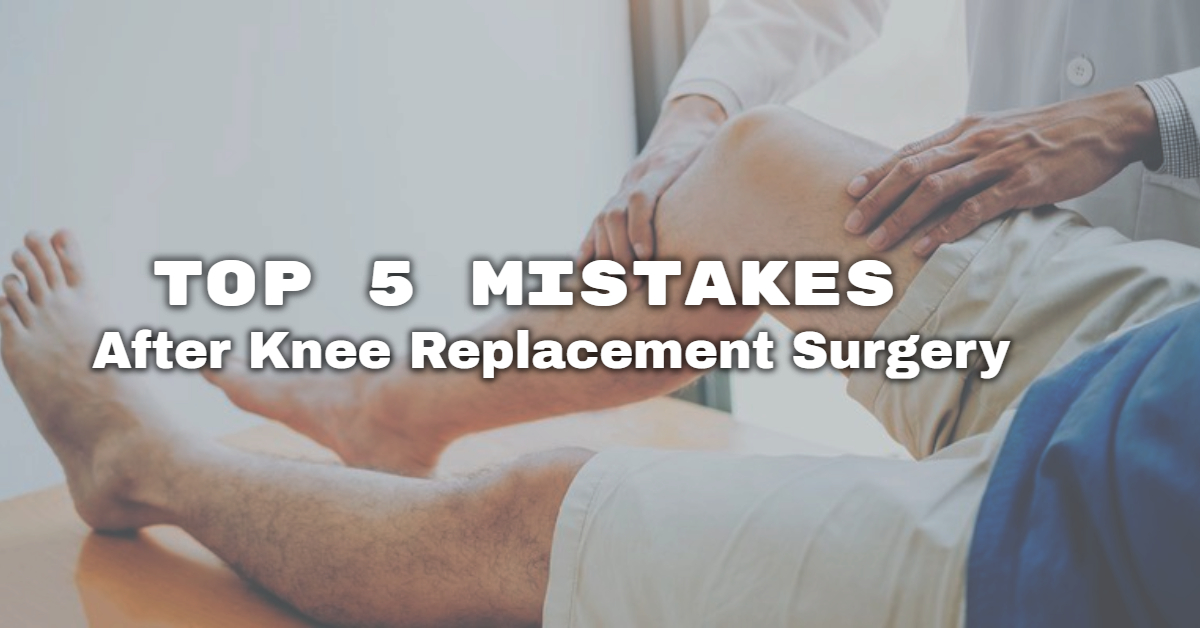
Recovering from knee replacement surgery can be tough with chances to improve or make mistakes. With more than 600,000 surgeries done every year in the United States, knowing the usual mistakes can really help someone get back to moving well and feeling less pain. This detailed article shines a light on the top five mistakes people often make after getting a knee replacement and offers practical tips for a better and quicker recovery. It helps you understand how to steer clear of these common slip-ups.
Introduction to Knee Replacement Surgery
Knee replacement surgery or knee arthroplasty is an operation that helps stop knee pain and makes the knee work well again. It has done a lot all over the world, mainly for people with knee problems from osteoarthritis, rheumatoid arthritis or other conditions that wear down the knee. While the surgery is a big step towards moving better and having less pain, the time after the surgery is just as important for getting better and making sure the results last a long time.
Importance of Post-operative Care
After knee replacement surgery, the care you get is key to how well the surgery works. It includes different ways to help heal, lower the chance of problems and make sure the knee works as well as it can. Listening to doctors and nurses and following their advice for getting better are very important parts of care after the surgery.
Mistake #1: Ignoring Physical Therapy
A big mistake people often make after knee replacement surgery is not taking physical therapy seriously. Physical therapy is very important for making the knee strong, flexible and able to move well. It stops the knee from getting stiff, keeps muscles from getting weak and helps avoid problems like blood clots. Not doing physical therapy regularly can slow down healing and result in not getting the best results from the surgery.
Mistake #2: Overexertion and Ignoring Limitations
Another error a lot of people make is doing too much too soon or ignoring the limits set because of the surgery. Even though everyone wants to get better fast, doing more than what’s advised can hurt the new knee joint, make pain worse and slow down healing. It’s key to slowly increase how much you do, following the plan given by doctors and nurses and stay away from activities that put too much pressure on the knee.
Mistake #3: Neglecting Pain Management
Managing pain well after surgery is very important to keep comfortable and help with rehab. A mistake some people make is not taking their pain medicine at all or not taking it as they should. This can cause a lot of discomfort, make it hard to do rehab exercises and slow down healing. Talking openly with doctors and nurses about how much pain you have and how you are using your medicine is key to managing pain the best way.
Mistake #4: Poor Nutrition and Hydration
Eating the right foods is very important for healing after knee replacement surgery. Not getting enough important nutrients, vitamins and minerals can make it harder for your body to fix tissues and fight swelling. Also not drinking enough water can slow down recovery and make symptoms like tiredness and constipation worse. It is crucial to eat a balanced diet with lots of protein, fruits and vegetables and to drink plenty of water because it is part of taking care of yourself after surgery.
Mistake #5: Skipping Follow-up Appointments
Going to regular check-ups with doctors after surgery is very important to keep track of how well you are healing, talk about any worries and spot any problems early. Some people don’t go to these appointments or delay them, thinking all is well. But these visits let doctors check on your recovery, change your treatment if needed and give advice on how to take care of yourself in the long run.
Conclusion
In conclusion, to get the best results and make the most of your knee replacement surgery it is very important to avoid common mistakes. This means making physical therapy a priority, listening to your body’s limits, handling pain well, eating right and drinking plenty of water and going to all your doctor’s appointments. Doing these things can help you to recover better and get back to moving easily with your new knee.
Unique FAQs
1) Is it normal to experience swelling and discomfort after knee replacement surgery?
Yes, it is normal to have swelling and discomfort at the beginning of healing. But if these feelings stay the same or get worse as time goes on, you should talk to your doctor or nurse.
2) Can I resume driving and other activities after knee replacement surgery?
It is very important to listen to what your doctor or nurse says about starting to do things again, like driving or other activities. Usually you can slowly start doing these things again, depending on how well you are healing.
3) How long does it take to fully recover from knee replacement surgery?
How long it takes to get better after surgery is different for everyone but many people see a big improvement in the first few months. Getting completely better can take from a few months to a year. This depends on things like how healthy you are overall and how well you follow your rehab plan.
4) Are there any specific exercises I should avoid after knee replacement surgery?
Doing light exercises is good because it helps with healing and moving better but you should stay away from activities that are too hard on the knee or put too much pressure on it. Your physical therapist can tell you which exercises are safe and right for you.
5) What are the signs of potential complications after knee replacement surgery?
If you start having more pain, swelling, redness, heat or any leaking from where the surgery was done or if it is hard to put weight on your leg or do normal things these could be signs that something is wrong. If any of this happens, you should quickly get in touch with your doctor or nurse to check what’s going on and figure out what to do next.


